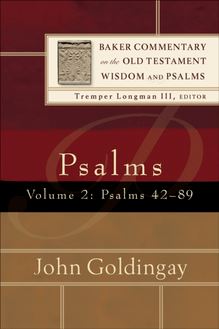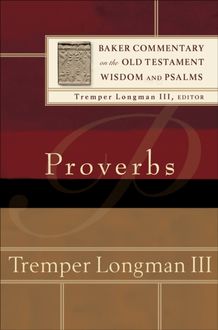Psalms : Volume 3 (Baker Commentary on the Old Testament Wisdom and Psalms) , livre ebook
532
pages
English
Ebooks
2008
Vous pourrez modifier la taille du texte de cet ouvrage
Obtenez un accès à la bibliothèque pour le consulter en ligne En savoir plus
Découvre YouScribe en t'inscrivant gratuitement
Découvre YouScribe en t'inscrivant gratuitement
532
pages
English
Ebooks
2008
Vous pourrez modifier la taille du texte de cet ouvrage
Obtenez un accès à la bibliothèque pour le consulter en ligne En savoir plus
Publié par
Date de parution
01 novembre 2008
Nombre de lectures
0
EAN13
9781441210661
Langue
English
Publié par
Date de parution
01 novembre 2008
Nombre de lectures
0
EAN13
9781441210661
Langue
English
© 2008 by John Goldingay
Published by Baker Academic
a division of Baker Publishing Group
P.O. Box 6287, Grand Rapids, MI 49516-6287
www.bakeracademic.com
Ebook edition created 2013
All rights reserved. No part of this publication may be reproduced, stored in a retrieval system, or transmitted in any form or by any means—for example, electronic, photocopy, recording—without the prior written permission of the publisher. The only exception is brief quotations in printed reviews.
ISBN 978-1-4412-1066-1
Library of Congress Cataloging-in-Publication Data is on file at the Library of Congress, Washington, DC.
Contents
Cover
Title Page
Copyright Page
Series Preface
Author’s Preface
Abbreviations
Psalm 90: Yhwh and Time
Psalm 91: Shadow of the Almighty
Psalm 92: Testimony, Praise, and Teaching
Psalm 93: Yhwh Began to Reign
Psalm 94: God of Redress
Psalm 95: Praise, Prostration, Obedience
Psalm 96: Why Yhwh Comes
Psalm 97: Yhwh Began to Reign: Earth Is to Rejoice
Psalm 98: God of Israel, God of the World
Psalm 99: Holy Name, Holy Place, Holy God
Psalm 100: Summons to All the Earth
Psalm 101: Leadership with Integrity
Psalm 102: My Time, Our Time, and Yhwh’s Time
Psalm 103: Restoration, Individual and Communal
Psalm 104: Yhwh in Relation to Creation Then and Now
Psalm 105: Yhwh Is Still the Same
Psalm 106: Recognizing Yhwh’s Judgment
Psalm 106:48: Coda to Book IV
Psalm 107: Yhwh Has Indeed Restored Israel
Psalm 108: Claiming God’s Promises
Psalm 109: How to Pray for Recompense
Psalm 110: King and Priest
Psalm 111: Worship and Wisdom
Psalm 112: Beatitudes
Psalm 113: Yhwh Sits on High, Looks Down Low
Psalm 114: Still the God of the Exodus
Psalm 115: God and Other Objects of Trust
Psalm 116: How to Give Your Testimony (II)
Psalm 117: Much in a Small Compass
Psalm 118: The Stone Spurned
Psalm 119: The Dynamics of the Moral Life
Psalm 120: War and Peace
Psalm 121: Yhwh as Helper, Maker, Guard
Psalm 122: For Jerusalem
Psalm 123: The Servant Looks to the Master
Psalm 124: Our Help Is Yhwh’s Name
Psalm 125: Well-Being on Israel
Psalm 126: Weeping and Laughter
Psalm 127: Yhwh Gives, Yhwh Fills
Psalm 128: Work, Home, Family
Psalm 129: The Promise of Empty Harvest
Psalm 130: From the Depths of Trouble and Waywardness
Psalm 131: How I Gave Up Trying to Fix Things, and So Should You
Psalm 132: The Reciprocity of Prayer
Psalm 133: How Wondrous Is Living as One
Psalm 134: The Reciprocity of Praise and Blessing
Psalm 135: How to Use Scripture in Praise
Psalm 136: Yhwh’s Commitment
Psalm 137: Being Mindful of Jerusalem
Psalm 138: Before Gods, Kings, Enemies
Psalm 139: Yhwh Can Know All about Me
Psalm 140: Caught in Their Own Trap
Psalm 141: Set a Watch at My Mouth
Psalm 142: How to Get Prayer to Work
Psalm 143: No Living Person Is Faithful before You
Psalm 144: The Interplay between Past Praise and Present Context
Psalm 145: Thine Is the Kingdom, the Power, and the Glory, Forever and Ever
Psalm 146: On Leaders
Psalm 147: God of Cosmos, Congregation, and City
Psalm 148: Creation’s Ring of Praise
Psalm 149: Preparing to Leave the Sanctuary
Psalm 150: The End of Prayer Is Praise
Glossary
Notes
Bibliography
Subject Index
Author Index
Index of Scripture and Other Ancient Writings
Series Page
Series Preface
At the end of the book of Ecclesiastes, a wise father warns his son concerning the multiplication of books: “Furthermore, of these, my son, be warned. There is no end to the making of many books!” (12:12). The Targum to this biblical book characteristically expands the thought and takes it in a different, even contradictory, direction: “My son, take care to make many books of wisdom without end.”
When applied to commentaries, both statements are true. The past twenty years have seen a significant increase in the number of commentaries available on each book of the Bible. On the other hand, for those interested in grappling seriously with the meaning of the text, such proliferation should be seen as a blessing rather than a curse. No single commentary can do it all. In the first place, commentaries reflect different theological and methodological perspectives. We can learn from others who have a different understanding of the origin and nature of the Bible, but we also want commentaries that share our fundamental beliefs about the biblical text. Second, commentaries are written with different audiences in mind. Some are addressed primarily to laypeople, others to clergy, and still others to fellow scholars. A third consideration, related to the previous two, is the subdisciplines the commentator chooses to draw from to shed light on the biblical text. The possibilities are numerous, including philology, textual criticism, genre/form criticism, redaction criticism, ancient Near Eastern background, literary conventions, and more. Finally, commentaries differ in how extensively they interact with secondary literature, that is, with what others have said about a given passage.
The Baker Commentary on the Old Testament Wisdom and Psalms has a definite audience in mind. We believe the primary users of commentaries are scholars, ministers, seminary students, and Bible study leaders. Of these groups, we have most in mind clergy and future clergy, namely, seminary students. We have tried to make the commentary accessible to nonscholars by putting most of the technical discussion and interaction with secondary literature in the footnotes. We do not mean to suggest that such information is unimportant. We simply concede that, given the present state of the church, it is the rare layperson who will read such technical material with interest and profit. We hope we are wrong in this assessment, and if we are not, that the future will see a reverse in this trend. A healthy church is a church that nourishes itself with constant attention to God’s words in Scripture, in all their glorious detail.
Since not all commentaries are alike, what are the features that characterize this series? The message of the biblical book is the primary focus of each commentary, and the commentators have labored to expose God’s message for his people in the book they discuss. This series also distinguishes itself by restricting its coverage to one major portion of the Hebrew Scriptures, namely, the Psalms and Wisdom books (Proverbs, Job, Ecclesiastes, and Song of Songs). These biblical books provide a distinctive contribution to the canon. Although we can no longer claim that they are neglected, their unique content makes them harder to fit into the development of redemptive history and requires more effort to hear their distinctive message.
The book of Psalms is the literary sanctuary. Like the physical sanctuary structures of the Old Testament, it offers a textual holy place where humans share their joys and struggles with brutal honesty in God’s presence. The book of Proverbs describes wisdom, which on one level is skill for living, the ability to navigate life’s actual and potential pitfalls; but on another level, this wisdom presents a pervasive and deeply theological message: “The fear of the L ORD is the beginning of knowledge” (Prov. 1:7). Proverbs also raises a disturbing issue: the sages often motivate wise behavior by linking it to reward, but in reality, bad things happen to good people, the wise are not always rewarded as they expect. This raises the question of the justice of God. Both Job and Ecclesiastes struggle with the apparent disconnect between God’s justice and our actual life experience. Finally, the Song of Songs is a passionate, sensuous love poem that reminds us that God is interested in more than just our brains and our spirits; he wants us to enjoy our bodies. It reminds us that we are not merely a soul encased in a body but whole persons made in God’s image.
Limiting the series to the Psalms and Wisdom books has allowed us to tailor our work to the distinctive nature of this portion of the canon. With some few exceptions in Job and Ecclesiastes, for instance, the material in these biblical books is poetic and highly literary, and so the commentators have highlighted the significant poetic conventions employed in each book. After an introduction discussing important issues that affect the interpretation of the book (title, authorship, date, language, style, text, ancient Near Eastern background, genre, canonicity, theological message, connection to the New Testament, and structure), each commentary proceeds section by section through the biblical text. The authors provide their own translation, with explanatory notes when necessary, followed by a substantial interpretive section (titled “Interpretation”) and concluding with a section titled “Theological Implications.” In the interpretation section, the emphasis is on the meaning of the text in its original historical setting. In the theological implications section, connections with other parts of the canon, both Old and New Testament, are sketched out along with the continuing relevance of each passage for us today. The latter section is motivated by the recognition that, while it is important to understand the individual contribution and emphasis of each book, these books now find their place in a larger collection of writings, the canon as a whole, and it is within this broader context that the books must ultimately be interpreted.
No two commentators in this series see things in exactly the same way, though we all share similar convictions about the Bible as God’s Word and the belief that it must be appreciated not only as ancient literature but also as God’s Word for today. It is our hope and prayer that these volumes will inform readers and, more importantly, stimulate reflection on and passion for these valuable books.
It has long been observed that the book of Psalms is a “microcosm” of the message of the Old Testament. At


